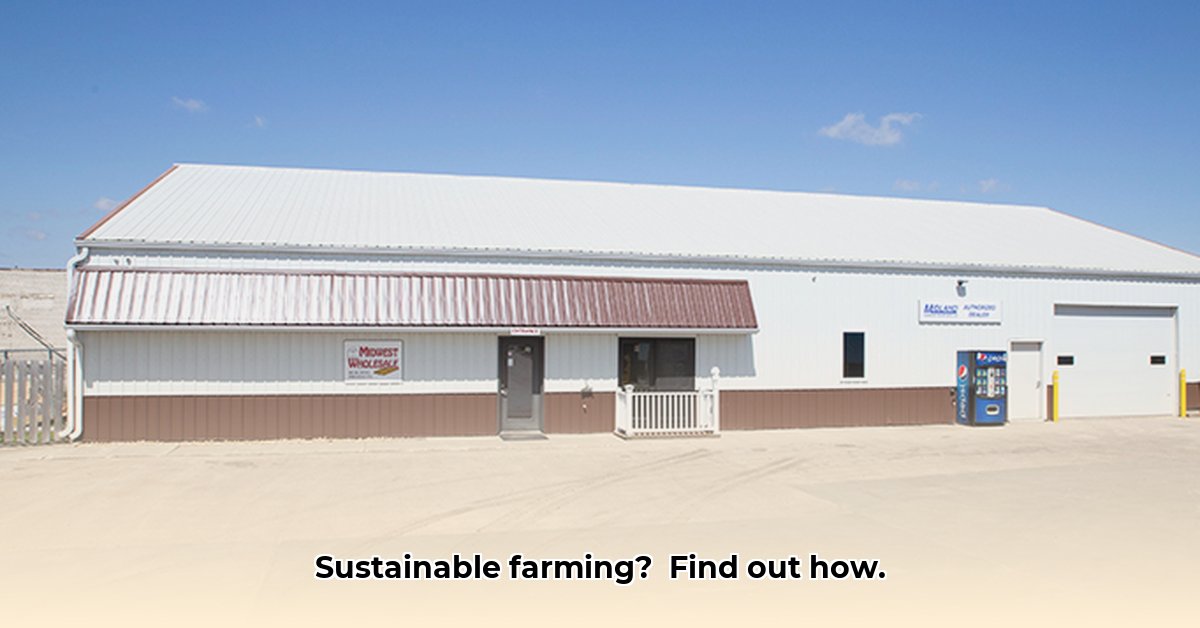
Finding the perfect used tractor can feel like searching for a needle in a haystack, especially when sustainability is a top priority. Midwest Wholesale Tractors offers a wealth of options, but navigating the used equipment market to find a fuel-efficient, reliable, and environmentally responsible machine requires careful consideration. This guide provides actionable steps to help you make informed decisions, ensuring both your farm's success and the planet's well-being. For more information on different tractor types, check out this helpful resource: Tractor Types.
The Challenges of Sustainable Tractor Purchasing
Buying a used tractor often comes down to budget and immediate needs. However, readily available information on a tractor's overall environmental impact – fuel efficiency, emissions profile, and maintenance history – is surprisingly scarce. This lack of transparency makes selecting a sustainable option a significant challenge when dealing with the used equipment market, including Midwest Wholesale Tractors. How can you confidently ensure you're not inadvertently increasing your farm's environmental footprint?
One major hurdle is the absence of standardized sustainability ratings for used tractors. Unlike new vehicles where fuel economy is prominently displayed, used tractors lack a consistent method for assessing their environmental performance. This makes comparing tractors difficult, hindering the adoption of more sustainable farming practices. While industry research is underway to address this, a standardized system is not yet widely implemented.
Another key challenge involves verifying the information provided by sellers. While some sellers meticulously document maintenance and usage, others may offer incomplete or inaccurate details. This necessitates diligent buyer investigation and pointed questioning to gain a clearer picture of the tractor's history and potential environmental impact.
Even with available historical data, understanding the true implications for fuel consumption and emissions can be complex. Factors such as engine type, age, operating conditions, and usage history all significantly influence a tractor's environmental footprint. This complexity underscores the need for a systematic approach to evaluating a tractor's sustainability.
Five Steps to a More Sustainable Tractor Purchase
This step-by-step guide empowers you to find a sustainable used tractor from Midwest Wholesale Tractors.
Step 1: Matching Tractor Capabilities to Your Farm's Needs
Assess your farm's needs: Avoid focusing solely on price. What tasks will the tractor perform? How much power (horsepower) is truly necessary? An oversized tractor, even a used one, will consume more fuel than a correctly sized machine, undermining long-term efficiency goals. Prioritize a machine with power that directly matches your requirements.
Research tractor types and sizes: Investigate different models suitable for your tasks and land size. Consider factors like fuel efficiency estimates based on engine types (e.g., diesel vs. gasoline) and transmission styles. Diesel engines generally offer better fuel efficiency for heavier tasks, but their emissions profile should also be considered.
Step 2: Meticulously Scrutinizing Sellers and Listings
Demand detailed maintenance records: Consistent servicing suggests responsible previous ownership and better longevity, leading to a reduced environmental impact due to a longer operational lifespan. Regular maintenance significantly extends engine life, minimizing the need for premature replacements.
Thoroughly check for wear and tear: Inspect for signs of excessive wear. This might indicate potential problems leading to increased fuel consumption or future repairs. A well-maintained tractor is more likely to be fuel-efficient and require less maintenance over time. Pay close attention to tire condition; worn tires increase rolling resistance and fuel usage.
Evaluate the seller's reputation: Investigate seller reviews and background where possible. A reputable seller from Midwest Wholesale Tractors will be transparent about the tractor's history and any known issues.
Step 3: Asking the Right Questions
Don't hesitate to ask probing questions: Inquire about fuel consumption ("What's the average fuel use per hour?"), past repairs ("Has the engine required any major work?"), and modifications impacting engine performance or emissions ("Have there been any modifications to the emission system?"). Details about the type of oil and filter used can also reveal past maintenance practices.
Probe deeper into usage history: Ask about the tractor's typical workload and operating conditions. A tractor used for light tasks will likely require less maintenance than one subjected to intensive work. Use history provides insights into potential future needs and maintenance requirements.
Demand documentation: Request documentation of previous repairs or maintenance schedules. This transparency allows you to effectively assess the tractor's history and reliability.
Step 4: Total Cost of Ownership: A Long-Term Perspective
Calculate long-term costs: Factor in fuel, maintenance (oil changes, filter replacements, etc.), and potential repair expenses over the tractor's lifespan. A cheaper initial purchase price might result in significantly higher operational costs over time, negating any initial savings.
Consider fuel price fluctuations: Research current and projected fuel prices to understand how they'll affect operational costs. These price variations significantly impact the long-term cost of ownership.
Include insurance and taxes: Include these often-overlooked expenses in your overall budget, accurately reflecting the total cost of ownership.
Step 5: End-of-Life Considerations: Planning for Responsible Disposal
Research disposal options: How will you responsibly handle the tractor at the end of its useful life? Many jurisdictions offer recycling programs. Investigate available options to minimize environmental impact.
Prioritize sustainable disposal services: Choose services that prioritize proper recycling or responsible dismantling rather than discarding the tractor in a landfill. Research companies specializing in environmentally conscious disposal of farm equipment.
Evaluate the potential for parts reuse: Consider the possibility of salvaging reusable components to reduce waste and extend the overall lifespan of the equipment.
Looking Ahead: Promoting Sustainability in Agriculture
Your purchasing decisions directly impact the agricultural industry's sustainability. By choosing fuel-efficient tractors and demanding transparent information, you incentivize Midwest Wholesale Tractors and other sellers to improve sustainability practices. Advocate for better data reporting and industry standards. Support sellers demonstrating environmental accountability. Your choices directly influence the evolution of sustainable agriculture. Remember, it's not just a trend; it's essential for the planet and the financial health of farmers.